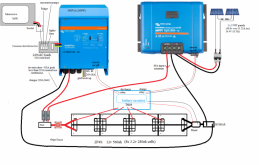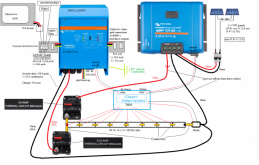John Frum
Tell me your problems
- Joined
- Nov 30, 2019
- Messages
- 15,230
You should have the disconnect between the panels and the solar charge controller.
You don't need one on the system side of the solar charge controller.
You don't need them in front of the inverters.
I assume you can turn them off
you should put a disconnect between the positive busbar and the battery.
Oh and a 300 mrbf fuse on each battery postive terminal.
You don't need one on the system side of the solar charge controller.
You don't need them in front of the inverters.
I assume you can turn them off
you should put a disconnect between the positive busbar and the battery.
Oh and a 300 mrbf fuse on each battery postive terminal.




